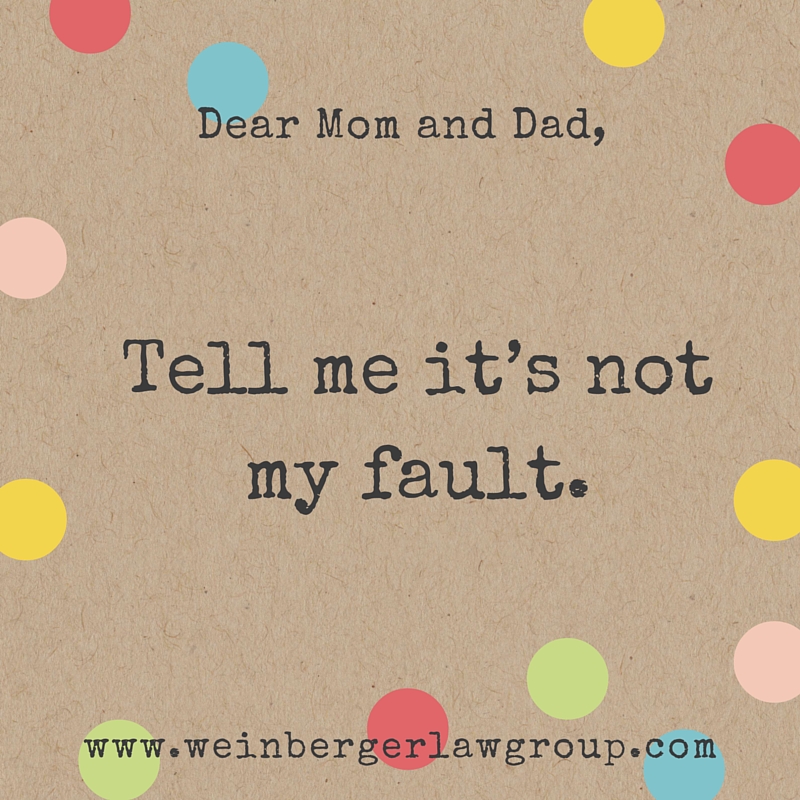The 5 Best Things You Can Do For Your Kids During Divorce
 You can’t change the fact that you’re getting divorced, but you can do things to ease the transition for your children. Read on to learn how you can support your child during this difficult time.
You can’t change the fact that you’re getting divorced, but you can do things to ease the transition for your children. Read on to learn how you can support your child during this difficult time.
1. Be a grown-up. Children should never feel that they have to take care of the adults in their lives. If you’re exposing them to anger outbursts, crying spells, or are using them as your therapist, you will scare them and burden them: in order for them to survive, they now think they have to make sure that you survive. This doesn’t mean you shouldn’t acknowledge problems (in fact, you should), but you need to model resilience when you do so — even on days when it seems that everything’s falling apart. For instance: “I know things are really difficult right now, but they won’t always be this way” or “I’m sorry I lost my patience this morning and snapped at you; it wasn’t your fault” or “You’ve seen me crying a lot lately and I want you to know that I’m seeing a doctor and taking medicine to feel better.” All parents can act less than parental at times, but your kids need to feel that overall, they can count on you for support, and not the other way around.
2. Oversee transitions. It’s nerve-wracking for a kid to get to school Monday morning and realize they left their unfinished science project at Dad’s on Friday. Ideally, you and your ex should communicate ahead of time about parenting time and what your child needs to bring to their other household: their retainer, ice skates, or copy of Lord of the Flies. If communication with your ex is challenging, you will need to up your game when it comes to managing your child’s belongings. This may mean a 9 p.m. drive to Dad’s house Sunday night to retrieve the dinosaur diorama. Kids will feel more secure if they know they have what they need at both houses – and that their parents will step in if they don’t.
3. Tell them the divorce is not their fault. Children, especially young children, see themselves as the center of the universe: if their world falls apart, it must be their fault. This false guilt is compounded when they hear parents argue about anything child-related. Even if your kids don’t directly express concern that they caused the divorce, they are invariably wondering what they did to blow up the family. Assure them – repeatedly – that the divorce has nothing to do with them: they didn’t cause it and it’s not their job to fix it. Tell them you and your ex are working on your co-parenting relationship so that everyone can get along better.
4. Support their relationship with the other parent. Repeat this mantra: “I love my child more than I hate my ex.” A surefire way to mess up your kid’s childhood is to undermine his relationship with his other parent. No matter what you think of your ex, or how many lousy things he or she did, that person will always be part of your child’s biological and/or psychological DNA. On some level, your child will internalize all the crappy things you say about your ex and feel that they must also be crappy by association.
For clarification, here is a partial list of unsupportive co-parenting techniques: bad-mouthing, obstructing visitation, interfering with phone calls with the other parent, making your child feel guilty for having a good weekend with the other parent, and being competitive with the other parent. Ways to support your child’s relationship with the other parent include: following the visitation schedule; facilitating phone/Sype/FaceTime calls with the other parent AND not using calls as a weapon to disrupt the other parent’s custody time; saying positive things about your ex and your ex’s family; being happy for your child when he tells you about the fun stuff he did with the other parent. Bottom line: you don’t need to like your ex to support your child’s right to have a relationship with his other parent.
5. Tell them you love them — and this will never change. Young children and anxious children may struggle with object constancy: trusting that a parent who goes away will return. Kids may interpret absences from a parent due to visitation schedules as a sign that the parent is disappearing from their life, or no longer cares about them. Assuage them of their worries by ensuring that they know when they will see you and that even in your absence, you still love them, and you will always be their parent. With all the changes in his life, your child – regardless of age — needs to know that your love is guaranteed.
Have questions about how to make your child custody agreement work? Our family law attorneys can help. Please contact us today to schedule your initial consultation.
Read More:
Can Co-Parenting After Divorce Really Work?
5 Rules for Successful Co-Parenting After Divorce
When Co-Parenting Doesn’t Work, Try Parallel Parenting



